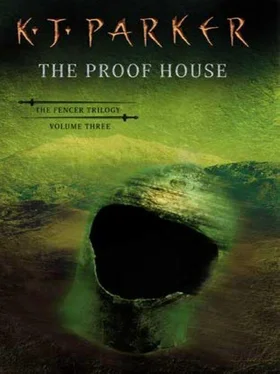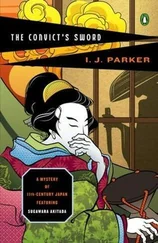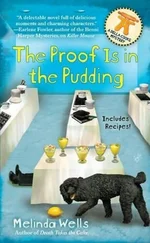K. Parker - The Proof House
Здесь есть возможность читать онлайн «K. Parker - The Proof House» весь текст электронной книги совершенно бесплатно (целиком полную версию без сокращений). В некоторых случаях можно слушать аудио, скачать через торрент в формате fb2 и присутствует краткое содержание. Жанр: Фэнтези, на английском языке. Описание произведения, (предисловие) а так же отзывы посетителей доступны на портале библиотеки ЛибКат.
- Название:The Proof House
- Автор:
- Жанр:
- Год:неизвестен
- ISBN:нет данных
- Рейтинг книги:4 / 5. Голосов: 1
-
Избранное:Добавить в избранное
- Отзывы:
-
Ваша оценка:
- 80
- 1
- 2
- 3
- 4
- 5
The Proof House: краткое содержание, описание и аннотация
Предлагаем к чтению аннотацию, описание, краткое содержание или предисловие (зависит от того, что написал сам автор книги «The Proof House»). Если вы не нашли необходимую информацию о книге — напишите в комментариях, мы постараемся отыскать её.
The Proof House — читать онлайн бесплатно полную книгу (весь текст) целиком
Ниже представлен текст книги, разбитый по страницам. Система сохранения места последней прочитанной страницы, позволяет с удобством читать онлайн бесплатно книгу «The Proof House», без необходимости каждый раз заново искать на чём Вы остановились. Поставьте закладку, и сможете в любой момент перейти на страницу, на которой закончили чтение.
Интервал:
Закладка:
Coriander; because the enemy’s bakers seasoned their bread with coriander, while the Great King’s bread was made with garlic salt and rosemary. In the wet air of the mines, you could smell coriander or garlic on a man’s breath fifty yards away; it was the only way to know he was there and which side he was on. Coriander, and pepper-sausage for the officers, smells death and danger. Rosemary and garlic are for home, rescue or the relief shift crawling up the spur towards you. Loredan pressed his boot flat against the board and exerted slow, even force, until he felt the nails draw out of the battens. Through, but into coriander. One damn thing after another.
Shuffling along on his arse, feeling his way with his heels, he edged through the breach in the wall until he came up against floorboards. One hell of a racket; but maybe it wouldn’t matter. It hadn’t occurred to him before now to wonder why the gallery had caved in; galleries cave in, it happens. But sometimes they cave in because the enemy undermines them, digging a spur of their own directly underneath and cutting out a chamber, called a camouflet, where they pile up barrels and jars of fat and rancid tallow, all hot, combustible stuff. As the fire burns it dries out the roof of the camouflet, the clay shrinks and suddenly there’s an unsupported hole in the gallery floor into which the whole gallery tries to pour itself, like water draining from a sink. The gallery caves in. Job done.
Well, then; if the enemy, coriander, is off down some spur of its own, it’s less likely to be tramping up and down its native gallery. A man, garlic, might slip through a breach in the wall and go unnoticed for quite some way before some bugger bumps into him and cuts his throat.
‘Gods know.’ (Voices coming, coriander; two men in a hurry, knees and palms bumping over the floorboards.) ‘Maybe we’re so close to their gallery that our wall’s subsiding into the hole. In which case we’ll get the whole bloody lot round our ears if we don’t get it shored quick.’
Bardas Loredan felt himself nodding in agreement; here was a man who knew his mines all right, the sort of man you’d want on your shift, except that he was the enemy. Two of them, and still coming on; hadn’t they got noses, he wondered, and then remembered that his shift hadn’t eaten for two days, what with one thing and all. No bread, no garlic, no smell to give you away. Stop eating and live for ever.
‘It’s a bugger, whatever it is,’ said the voice that went with the other pair of knees. Bardas felt in the top of his boot for the hilt of his knife; if the first one really was scent-blind, he’d have him, definitely. It’d be the second who’d have Bardas. Sacrifice your knight to take his rook; no fun at all if you’re the knight. But: the hell with it. It’s every soldier’s duty to seek out and destroy the enemy. So, let’s do that, then.
He let the first voice go by, and when the second voice was almost past him, he reached out carefully with his left hand, hoping for a chin or a jaw. Of course, this was the bit he was good at. His fingertips brushed against a man’s beard, long enough for him to wind his fingers into and get a good grip. Before the man had a chance to make a sound, Bardas had stabbed up into the triangular cavity at the junction of neck and collar-bone, where death can come in quicker and quieter than anywhere else. The fashion in the mines was for short knives (short knives, short men, short spades, short lives; you got nothing for tall down the mines). He was in and out so smoothly that there was a fair chance the other man hadn’t even noticed.
Nevertheless; ‘Thank you,’ Bardas muttered as he twisted the knife to free the blade. It was an unbreakable rule of the mines that you thanked the man who died in your place, when one or the other of you had to go. By speaking aloud he’d announced his presence in unmistakable terms, but he still had the advantage. The man, coriander, in front of him hadn’t a hope of turning round in the cramped shaft of the gallery, which meant that his options were to hold still and try to kick backwards with his heels like a mule, or to rapid-crawl on his hands and knees like a little child scurrying under a table, in the hope of finding a spur to crawl down before his enemy realised he’d gone. Then it’d be the other way round, of course; no fun, so let’s not allow that to happen.
With a soft grunt of revulsion Bardas Loredan crawled over the body of the man, coriander, he’d just killed, feeling the palms of his hands and the caps of his knees digging into the soft flesh of the dead man’s belly and cheeks. He sniffed like a polecat to get a fix on his quarry, heard the scrape of a wooden clog-sole on a stone – almost close enough but not quite – so he hopped along, hands outstretched, shoving himself forward with his legs like a rabbit until he knew his face was within a few inches of the other man’s heels. The spring, when he made it, was more froglike than feline; he landed heavily, jarring his elbows on the man’s shoulder-blades. Afterwards, he thanked him.
Now what? Of course, he hadn’t a clue where he was. In his own tunnels he could find his way easily enough; in his mind’s eye he had a picture of a whole honeycomb of galleries, shafts and spurs he’d never actually seen but knew intimately nonetheless. He didn’t even have to count the movements of his knees as he crawled forward to know where the spur gates were, or where the spur ended and the gallery began. He simply knew where they were, like a juggler with his eyes shut. But in these mines, coriander, he had no idea. The darkness here was genuinely dark to him, and he felt the lowness of the roof and the narrowness of the space between the walls as if it was his first day out of the light.
Common sense, common sense. If this is a gallery (too wide and high to be a spur), chances are it runs to the face from the lift-shaft – which begged the questions: which way is which, and which way did he actually want to go? Avoiding the enemy was definitely a priority, but not if it meant heading deeper and further into exclusively hostile ground. To the best of his knowledge, the only interface between his tunnels, garlic, and the enemy’s was the hole he’d just wriggled through, so no way back. Forward – either direction – would sooner or later bring him up against an enemy camp or working shift, and even he couldn’t kill them all.
It’s customary to die first … If only he could smell fresh air, he’d know which end was the lift-shaft; but he couldn’t, only a stale, lingering flavour of coriander and the heavy scent of the dead men’s blood on his clothes and hands. If he didn’t do something soon, fear would catch up with him and he’d be paralysed – he’d come across men, coriander, in that state before now, crouched against a wall with their hands over their ears, unable to move. Left, then; he’d go left, because if he was still in his own tunnels he’d go right to get to the lift-shaft. Totally flawed logic, but he couldn’t hear anybody objecting. Exactly why he should want to make for the lift he didn’t know. Just supposing he was able to creep into one of the spoil-baskets and get lifted up out of the mines without anybody noticing, once he reached the surface he’d be inside the enemy city, a dirty, bloody man marinaded in the wrong herbs and spices. But if he went the other way, to the face – where would the face be, now? Presumably, at the end of the spur where they’d laid their camouflet. Effectively, he’d have gone round in a circle, but there might be a chance of breaking through, if (say) the spur, coriander, ran closely parallel with the gallery, garlic, to any extent. Even if that worked out, of course, there was the intriguing risk that he’d come though into his native gallery at some point after the cave-in, where he’d be just as trapped as he’d been in the spur. Only one way to find out. He’d go right, and see what happened.
Читать дальшеИнтервал:
Закладка:
Похожие книги на «The Proof House»
Представляем Вашему вниманию похожие книги на «The Proof House» списком для выбора. Мы отобрали схожую по названию и смыслу литературу в надежде предоставить читателям больше вариантов отыскать новые, интересные, ещё непрочитанные произведения.
Обсуждение, отзывы о книге «The Proof House» и просто собственные мнения читателей. Оставьте ваши комментарии, напишите, что Вы думаете о произведении, его смысле или главных героях. Укажите что конкретно понравилось, а что нет, и почему Вы так считаете.












